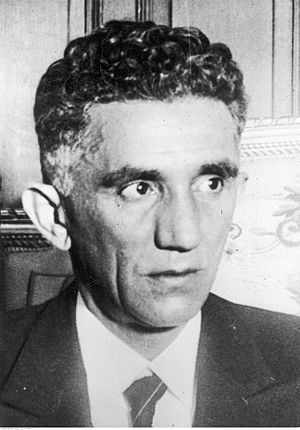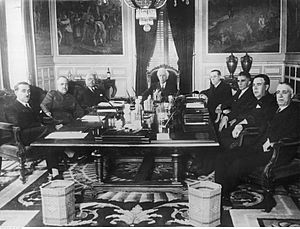Manuel Rico Avello facts for kids
Quick facts for kids
The Most Excellent
Manuel Rico Avello y García de Lañón
|
|
|---|---|

Rico Avello in 1936
|
|
| Minister of Finance | |
| In office 30 December 1935 – 19 February 1936 |
|
| President | Niceto Alcalá-Zamora |
| Prime Minister | Manuel Portela Valladares |
| Preceded by | Joaquín Chapaprieta |
| Succeeded by | Gabriel Franco López |
| Spanish High Commissioner in Morocco | |
| In office 23 January 1934 – 11 January 1936 |
|
| Monarch | Mohammed V |
| President | Niceto Alcalá-Zamora |
| Prime Minister |
|
| Preceded by | Joan Moles i Ormella |
| Succeeded by | Manuel de la Plaza Navarro (Acting) |
| Minister of the Interior | |
| In office 8 October 1933 – 23 January 1934 |
|
| President | Niceto Alcalá-Zamora |
| Prime Minister |
|
| Preceded by | Diego Martínez Barrio |
| Succeeded by | Diego Martínez Barrio |
| Subsecretary for the Merchant Navy | |
| In office 21 September 1933 – 14 October 1933 |
|
| President | Niceto Alcalá-Zamora |
| Prime Minister |
|
| Preceded by | Leonardo Martín Echeverría |
| Succeeded by | Sergio Andión Pérez |
| Member of the Congress of Deputies | |
| In office 27 February 1936 – 23 August 1936 |
|
| Constituency | Murica |
| In office 7 July 1931 – 2 October 1933 |
|
| Constituency | Oviedo |
| Personal details | |
| Born |
Manuel Rico Avello y García de Lañón
December 20, 1886 Valdés, Asturias, Kingdom of Spain |
| Died | August 23, 1936 (aged 49) Cárcel Modelo, Madrid, Second Spanish Republic |
| Cause of death | Murder |
| Political party | Party of the Democratic Centre (1936) |
| Other political affiliations |
|
| Spouse |
Castora Rico Rivas
(m. 1914–1936) |
| Children | 3 |
| Alma mater | University of Oviedo |
| Occupation | Politician, lawyer, and journalist |
| Awards | Grand Cross of Naval Merit |
Manuel Rico Avello y García de Lañón (born December 20, 1886 – died August 23, 1936) was an important Spanish politician, lawyer, and journalist. He held several high-ranking positions during the Second Spanish Republic. These roles included Minister of the Interior, Spanish High Commissioner in Morocco, and Minister of Finance. He was put in prison by the government at the start of the Spanish Civil War. Sadly, he lost his life during this difficult time, along with other political prisoners.
Contents
Manuel Rico Avello's Life Story
Early Years and Family Life
Manuel Rico Avello was born on December 20, 1886, in Valdés, Asturias, a region in Spain. He was the first of eleven children in his family. His father, José Rico García-Lañón, was a well-off businessman and later became a mayor in Valdés. His mother was Dolores Avello Suárez.
In 1914, Manuel Rico Avello opened his own law office in Oviedo. Around the same time, he married his second cousin, Castora Rico Rivas.
A Career in Politics
Manuel Rico Avello began his political journey when he was elected to the Congress of Deputies in 1931. The Congress of Deputies is like a country's parliament, where elected officials make laws. He represented the area of Oviedo and was considered an 'independent federalist'.
In September 1933, he was given a government job as the Subsecretary for the Merchant Navy. This role meant he helped manage Spain's commercial ships and sea trade. Because of a rule about holding too many government jobs at once, he had to leave his seat in the Congress of Deputies.
Just a month later, on October 8, 1933, Rico Avello became the Minister of the Interior. This was a very important job, as he was in charge of internal affairs, including public safety and the police force, like the Civil Guard. He continued in this role under different Prime Ministers. Some members of the Civil Guard felt he didn't ask for their opinions enough when he tried to make changes to their group.

One of the Prime Ministers he worked with, Alejandro Lerroux, described Rico Avello as a "man of 'good will'" with a "noble character." Lerroux also noted that Rico Avello's appointment was influenced by the President, Niceto Alcalá-Zamora. Rico Avello himself understood the importance of his role. He told reporters that his job was like a football referee, making sure everyone played fairly.
In January 1934, he was appointed Spanish High Commissioner in Morocco. This meant he was Spain's main representative in Morocco. Some people thought this move was to remove him from his previous role as Minister of the Interior, where his performance was not seen as perfect.
In early 1936, there was talk that the President might choose Rico Avello to become the new Prime Minister. This would have put him at the head of a new government.
During the Spanish Civil War
On August 14, 1936, Manuel Rico Avello and his son, Carlos, were arrested. They were taken to the Cárcel Modelo prison. A few days later, on August 22, a fire started in the prison. During the confusion, a group of prison guards and militiamen took control. That same night, Manuel Rico Avello and at least 23 other political prisoners lost their lives in the prison basement.
See also
 In Spanish: Manuel Rico Avello para niños
In Spanish: Manuel Rico Avello para niños
 | William L. Dawson |
 | W. E. B. Du Bois |
 | Harry Belafonte |

